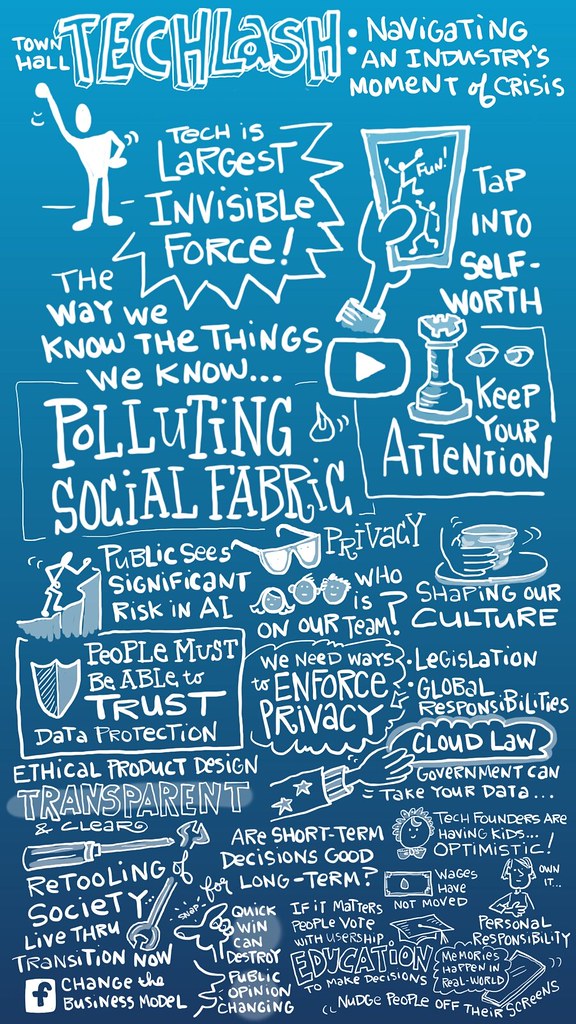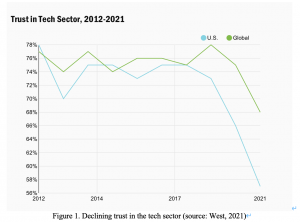Techlash: revealing the negatives associated with technology development
 “Techlash” by Fortune Conferences is licensed under CC BY-NC-ND 2.0
“Techlash” by Fortune Conferences is licensed under CC BY-NC-ND 2.0
While digital development in the recent decades transforms the lifestyle of the new generation, the appearance of a growing trend of techlash that batters the technology sector reveals public concerns on the rapid pace of technological change and the negative aspects associated with it.
The way how people view large platform technology companies
Techlash stands for the rising public animosity against large platform technology companies both in and out of the US, as defined by Rana Foroohar (2018) from the Financial Times. It mainly involves large Silicon Valley companies like Facebook, Apple, Amazon, Netflix, and Google, and their Chinese equivalents. These companies have been frequently accused of manipulations on elections, collection of user information, and infringement of people’s privacies (Foroohar, 2018). After these issues were revealed, the public trust on the technology sector has dropped sharply especially after 2018. The following diagram from Edelman Trust Barometer reflects a sharp drop in trust in the tech sector since 2018 both in the US and in the world, and the current public trust levels in the tech sector are extremely low in the US (West, 2021).

Figure 1. Declining trust in the tech sector (source: West, 2021)
The negative side of technology development
Declining trusts reveal the negative side of technology development that has raised public attention in the recent two to three years. Specifically, people are currently worried about information collected on social media and other online platforms. Dijeck et al. (2018) in their book, The Platform Society, reveal a common component of the operation of an online platform is data collection and usage. Based on their research on Airbnb, they found that Airbnb not only collected user information data but also sold this data to third parties for targeted advertising purposes (Dijeck et al., 2018, p. 27). This reveals a major flaw in the business model of platform technology companies that they made money through manipulating information and data collected. The web-inventor, Sir Tim Berners-Lee in his lecture after thirty years of web development, asserts that the system design of platform technology companies’ making profits relying on advertisements creates strong incentives to harm user values rather than protecting them, and that’s why more and more people are currently against those companies, resulting in a trend of techlash (Web Foundation, 2019).
(The full lecture can be heard at https://webfoundation.org/2019/03/web-birthday-30/)
In addition, another negative aspect associated with technology is a new online value system and culture it creates that is not necessarily a good one. This issue is extremely serious on social media platforms. For example, Facebook is criticised by many for promoting hate speech and the spread of false information, which raises public concerns about its impacts on the young generations particularly (Cohen, 2019). The hate speeches encourage a culture of intolerance towards others, contrary to the normal common cultural value advocated in the society (Cohen, 2019). The major issue underlying is that these platforms manage the contents based on a principle of popularity or creating incentives for more user engagement, considering nothing about the quality of the contents and their impacts on the users. And outraged and polarised tones attract more attention (Web Foundation, 2019). Thus, false information and bad culture can be easily circulated on these platforms, threatening the value systems of the young.
What should be done to eliminate the opposed influence
Despite the worries and declining trusts, the reliance on technological services is expected to continuously grow in the following decades, especially during and after the Covid-19 pandemic. The social distancing policies in cope with the pandemic strongly push forward the pace of digitalisation of all services, and contribute to the flourish of more online platforms. For example, students have to rely on Zoom to take classes, and online shopping also boomed after the pandemic (West, 2021). David Karpf (2018) predicted an unstoppable trend of a replacement of the traditional economy by the digital economy, and the pandemic accelerates the replacement pace. However, the public worries and concerns on the negative aspects have to be appropriately addressed before further development, and two major parties sharing the duties of addressing these concerns are governments and those tech companies.
 “Policies for platforms: supporting and regulating digital platforms” by ITU Pictures is licensed under CC BY 2.0
“Policies for platforms: supporting and regulating digital platforms” by ITU Pictures is licensed under CC BY 2.0
First, governments are expected to issue appropriate regulations over the practices of platform technology companies in order to protect the rights and interests of the users and ensure a good online culture and environment. Bill Gates believes government can take a major role in protecting user privacy (Huddleston, 2019). Foroohar (2018) believes government should take the main responsibility for responding to the issues brought up by the techlash and improve the public trust in the tech sector. In fact, some governments have already made much effort. For instance, in 2017 the European Commission issued a 2.7 billion fine against Google, followed by Germany and France’s warnings against Facebook on tracking user data beyond fair use and its sharing user information between its various apps (Smith, 2018). Some American state governments also started investigations over the practices of large tech companies (West, 2021). Governments can also use the approaches like increasing taxes, issuing bans over certain applications, setting limits on product rollouts potentially harmful for humanity, requiring these platforms to police user-generated content, and so on (West, 2021). However, many believe that what governments can do is quite limited, especially in a neoliberal economical context that allows much freedom for business operations (Crescioli, 2020). Atkinson et al. (2019) advise the government to regulate tech companies based on a principle of “tech realism”, and develop smart, well-considered, and effective regulations while recognising the critical role of how tech companies serve for the development. These opinions reflect that governmental regulations are necessary but not enough.
Listen to a briefing from The Economist on Techlash and responses on: https://www.economist.com/briefing/2018/01/20/the-techlash-against-amazon-facebook-and-google-and-what-they-can-do
As governmental regulations are inadequate, self-regulation of the tech giants is necessary. The tech giants actually are conducting a series of self-regulation approaches like regularly policing user-generated content and remove illegal and fraudulent content from the platforms (Susaria, 2021). But they can do more. Hemphill’s (2019) research on techlash reveals that social media companies who are mainly attacked under the techlash can form a self-regulating organisation (SRO) for industry self-regulation, and this organisation has to display a high level of transparency and accountability in order to gain the public trust. This SRO is expected to regulate platform economy firms on the key issues raising techlash, and assist trade-offs made by those companies for the competing values of key stakeholders like users, small tech companies, and governments (Hemphill, 2019). This is a collective industry approach to regulations. For individual conduct, Susaria (2021) suggests these companies deprioritise the target of user engagement, label misinformation through effective approaches, and clarify the social responsibilities of the organisations. Either industry approach or individual approaches can improve the situation and enhance public confidence.
 “Fortune Brainstorm Tech 2018” by Fortune Conferences is licensed under CC BY-NC-ND 2.0
“Fortune Brainstorm Tech 2018” by Fortune Conferences is licensed under CC BY-NC-ND 2.0
In sum, techlash is a growing trend among the public against the tech giants that threaten the privacy, right, values, and culture of the users. The business model of these companies makes them more likely to generate profits at the cost of the interests of their users. They have played a critical role in improperly using user information, assisting bad culture, spreading misinformation, and manipulating political actions through their influence. As digitalisation is further assisted by the regulations in cope with the pandemics, actions must be taken to deal with the concerns above. Specifically, governments can issue more regulations and investigations over the practices of tech giants. Also, the industry can form a self-regulating organisation responsible to make effort across various companies. Additional management addressing these issues in individual companies help combat the techlash as well. All these actions can be expected to mitigate the negative impacts associated with technological developments and ease the techlash.
References
Atkinson, R. D., Brake, D., Castro, D., Cunliff, C., Kennedy, J., McLaughlin, M., McQuinn, A. and New, J. (2019). A policy-maker’s guide to the techlesh – what it is and why it’s a threat to growth and progress. Information Technology and Innovation Foundation. Retrieved from https://itif.org/publications/2019/10/28/policymakers-guide-techlash
Cohen, S. B. (2019). Read Sacha Baron Cohen’s scathing attack on Facebook in full: greatest propaganda machine in history. The Guardian. Retrieved from https://www.theguardian.com/technology/2019/nov/22/sacha-baron-cohen-facebook-propaganda
Crescioli, T. (2020). Tech gaints and competition: a political economy perspective. E- international relations. Retrieved from https://www.e-ir.info/2020/10/27/tech-giants-and-competition-a-political-economy-perspective/
Dijeck, V., Poell, T. and de Waal, M. (2018). The Platform Society. Oxford: Oxford University Press, pp. 5-32
Foroohar, R. (2018). Year in a word: techlash. Financial Times. Retrieved from https://www.ft.com/content/76578fba-fca1-11e8-ac00-57a2a826423e
Huddleston, T. (2019). Bill Gates: government needs to get involved to regulate big tech companies. CNBC. Retrieved from https://www.cnbc.com/2019/10/17/bill-gates-government-needs-to-regulate-big-tech-companies.html
Hemphill, T. A. (2019). ‘Techlash’, responsible innovation, and the self-regulatory organization. Journal of Responsible Innovation, 6(2), 240-247. DOI: 10.1080/23299460.2019.1602817
Karpf, D. (2018). 25 years of WIRED predictions: why the future never arrives. WIRED. Retrieved from https://www.wired.com/story/wired25-david-karpf-issues-tech-predictions/
Smith, E. (2018). The techlash against Amazon, Facebook and Google—and what they can do. The Economist. Retrieved from https://www.economist.com/briefing/2018/01/20/the-techlash-against-amazon-facebook-and-google-and-what-they-can-do
Susaria, A. (2021). If big tech has the will, here are ways research shows self-regulation can work. The Conversation. Retrieved from https://theconversation.com/if-big-tech-has-the-will-here-are-ways-research-shows-self-regulation-can-work-154248
Web Foundation. (2019). 30 years on, what’s next #ForTheWeb. Retrieved from https://webfoundation.org/2019/03/web-birthday-30/
West, D. W. (2021). Techlash continues to batter technology sector. Brookings. Retrieved from https://www.brookings.edu/blog/techtank/2021/04/02/techlash-continues-to-batter-technology-sector/